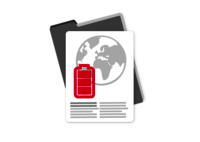If you have Substances of Very High Concern (SVHCs) with a concentration above 0.1 g/kg per material in your products, you are required to report this as of 5 January 2021 by entering the concentrations, the components and the test documents in the new SCIP database. SCIP stands for “Substances of Concern In articles as such or in complex objects (Products)”. This is provided for by EU legislation (EU) 2018/851.
In the past, manufacturers were only required to notify their B2B customer informally or provide the end customer with information on request within a period of 45 days.
The SCIP database to be used now has a public part in which e.g. B2B customers or end users, but also disposal companies, can have access to SVHC information. The non-public part contains e.g. the test documents and is intended for inspection e.g. by supervisory authorities.
In Germany, at present there is only an informal obligation to report to the ECHA, the European Chemicals Agency, pursuant to Section 16f of the Chemicals Act (ChemG), which does not include the obligation to actually use the SCIP database. It remains to be seen how long this German path can be maintained. If you wish to set up your business in a future-proof way or sell your products to other EU countries, you will probably not be able to avoid using the SCIP database.
Are your products SVHC-free? You will only know this once you have valid test documents in hand. However, many products can already be seen to contain SVHCs. Examples are products with aluminium or brass alloys, with plug contacts or certain electronic components.
The new transparency of the publicly accessible SCIP database is a real invitation to establish whether such products are on record in the database. Both market participants and regulatory authorities can give you cause for concern when you take this path. Whereas product managers previously only responded reactively, they are consequently now obliged to ensure prevention.
Do not push your luck - take action now! The trade-e-bility team will support you with advice on the choice of the economically reasonable means all the way through to entering the reports in the SCIP database. If you have any questions, please do not hesitate to contact trade-e-bility by calling +49/40/75068730-0 or sending an e-mail message to sales@trade-e-bility.de.

